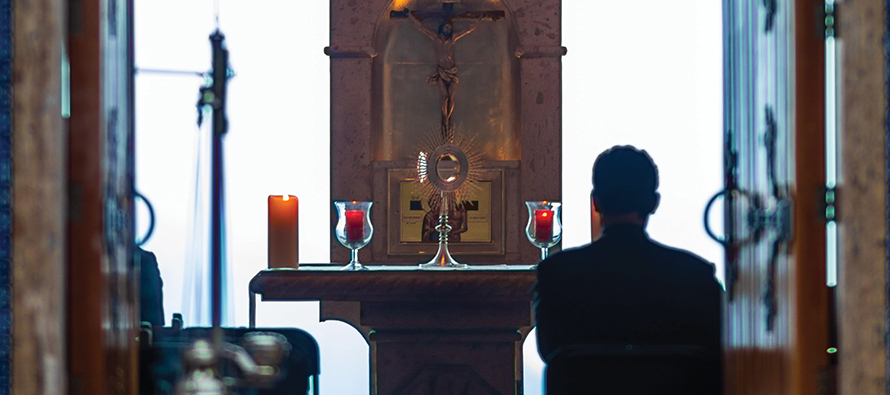Religious seekers in legal limbo

Those living in the United States without legal documents face uncertainty when it comes to joining a religious community. (Edgar Henriquez, Unsplash)
AS IMMIGRATION ATTORNEYS working with religious organizations and international religious workers from all over the world, we know about the complexities involved in pursuing a vocation to consecrated life in the United States if you do not have citizenship.
You don’t always know where God will call you to serve. A call to consecrated life is a call to follow Christ with one’s whole heart, loving him and others the way he loved us. Obedience to that call can sometimes be challenging if you are called to serve away from the country where you were born. Does your religious vocation call you to the United States? There are several scenarios to look at.
Dreamers and others without lawful status
Let’s first look at a common situation, that of Dreamers—those born elsewhere, brought outside the law to the United States, and raised here. In addition to Dreamers, other adults are already in the United States but lack lawful status.
Unfortunately there are no easy solutions to resolve issues of unlawful immigration status. The Deferred Action on Childhood Arrivals (DACA) program, implemented in 2012, has provided some legal protection for certain younger immigrants, but legal challenges have limited the program for the time being. Its future is also uncertain. Regardless of the few remedies available, it is still important for those individuals to speak with an experienced immigration attorney or immigration specialist who can thoroughly screen their immigration background to ensure that all possible options are considered. In addition, though it may not seem possible at the present time, there is still some hope that Congress will act to address the millions of members of our communities and their families who, but for their immigration status, benefit the United States.
Sometimes a person in discernment or initial formation with an international religious institute will be able to pursue studies and formation in the country of their birth. This option would come at a high cost, however, if the person cannot legally re-enter the United States. This may not be an advisable choice for many because of the risks and pressures it puts on the person’s discernment and formation.
Tourist visas
In addition to Dreamers and others without legal status, there are those who live outside the United States but want to come here to enter a religious institute. One way to at least begin this process—working closely with a religious community, of course—is to gain and use a tourist visa. Each year millions of visitors travel to the United States for many different reasons. Some come to visit family and friends, others to study, and others to work. For those pursuing consecrated life, various visa options may be available, including the most commonly available type: the tourist visa.
The tourist visa is also known as a B1/B2 visa. Prior to the pandemic, the U.S. Department of State would regularly grant more than 5 million B1/B2 visas each year to those seeking to visit the United States for a temporary stay. When applying for this type of visa, the applicant must show he or she intends to only visit temporarily and will return home. It is important to know that the B1/B2 visa does not give the visitor permission to work or be employed in the United States.
For example, suppose Sister Maria from Ecuador would like to join her sisters in the United States to celebrate their community’s jubilee anniversary. The B1/B2 visa would be appropriate. Suppose Sister Maria has a cousin, Daniela, who is interested in learning about the order and pursuing a religious vocation in the United States. Daniela could use a B1/B2 visa for that initial visit and short discernment period.
Student visas
Other times—with permission from their religious superior—people becoming sisters, brothers, or priests may be interested in attending a U.S. college or university as part of their religious formation or education. They must first be accepted at the college or university. Then a designated school official must issue the student a form to apply for an F-1 student visa. As with the B1/B2 tourist visa, applicants must show their intention to visit temporarily and return home at the end of the academic program. Also, the student must be enrolled full time to maintain F-1 student status while in the United States.
For example, suppose Alex from the Philippines has been accepted at a seminary in the United States to begin education and formation to become a priest. The F-1 student visa would allow him to enter the United States and permit him to study there for four to six years. Suppose Sister Monica from Ghana has been instructed by her superior to obtain a master’s degree in education in the United States. She could use an F-1 visa to pursue her studies.
Religious worker visa
Finally, there are times when religious (or people becoming part of a religious community) who live in another country are called to minister in the United States.
The R-1 religious worker visa program was created for international religious workers assigned or called to serve and work for a nonprofit religious organization, such as a religious institute, archdiocese, diocese, or parish in the United States. Through this visa program, an individual becoming a Catholic sister, brother, priest, minister, or other traditional religious occupation is permitted to come to the United States temporarily to be employed by the religious organization and pursue their religious vocation. For example, Sister Reina from El Salvador has been instructed by her superior to join their convent and community in Texas to teach religious education at a local parish for the next three years. The R-1 visa would be required for her to teach and would be appropriate for her situation. Roberto from Italy is a novice who has been assigned to complete his novitiate year at the institute’s monastery in the United States before he takes first vows. He could use an R-1 visa to complete this part of his formation before taking his vows.
The R-1 visa process is not always easy however. The religious organization must first file a petition with the immigration service. After the petition is approved, the religious worker can then apply for the R-1 visa. There can be delays in processing immigration paperwork here in the United States and at U.S. embassies or consulates abroad. The program also includes site visits by the immigration service and increased scrutiny. However, if all goes well, the religious worker will obtain an R-1 visa and be permitted to stay in the United States for a temporary time (2.5 years and then another 2.5 years if an extension is requested).
Whatever purpose brings a religious individual to the United States, there are many visa options to consider. Most important, the visitor must know the limits and permissions of his or her visa and know how long he or she may lawfully stay in the United States. We encourage all religious individuals to speak with an immigration attorney or immigration specialist so he or she fully understands the limits of the visa they use.
Consecrated life has had an international aspect to it for centuries, so these questions of moving, studying, and ministering across borders will be with us for the foreseeable future. If you are in discernment with a U.S.-based religious institute and have concerns about citizenship or visas, it is good to discuss these topics with your vocation or formation minister or your religious superior. We wish you peace and blessings as you seek to follow God’s call.
The information in this article is not intended as legal advice and should not be taken as such.
Tags
Related
- Questions you’ll be glad you asked
- What monastic mystics got right about life
- Religious communities embrace diverse members
- How my parents responded when I became a brother
- Vocation Basics: You are already called—Message to youth from Pope Francis
- Meet the parents
- Charism: The gift that shapes lives
- What our vows mean
- Discover five treasures of religious life
- Religious making a difference Read More
Most Viewed
- Find your spirituality type quiz
- Questions and answers about religious vocations
- Celibacy quiz: Could I be a nun? Could I be a brother? Could I be a priest?
- Resources for older discerners or those with physical and developmental differences
- About Vocation Network and VISION Guide



